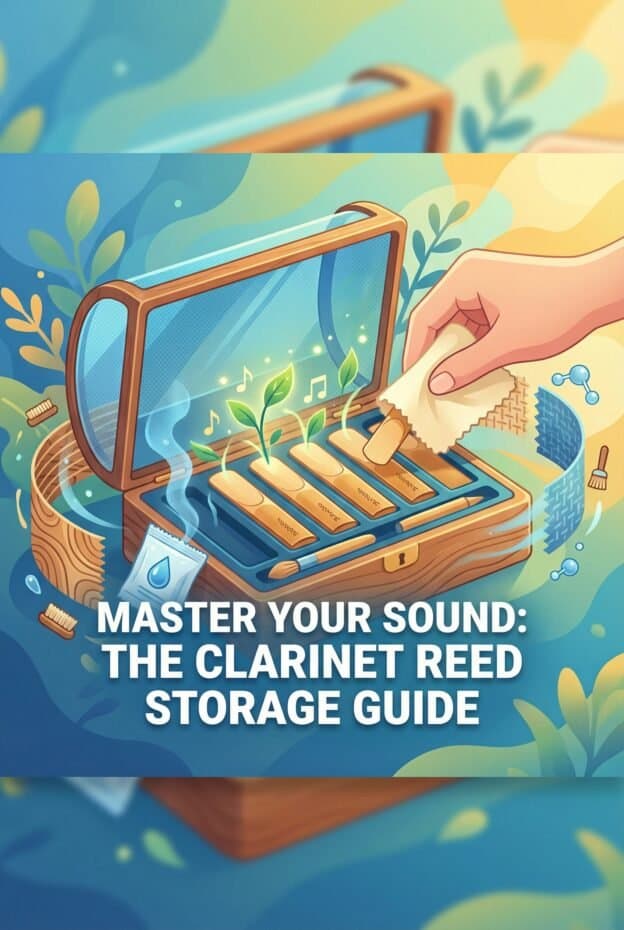What does a clarinet reed storage case do? A clarinet reed storage case protects reeds from physical damage, controls humidity, and keeps them organized so they dry flat between uses. It reduces warping, mold, and chips while extending reed life.
5-point buying checklist: 1) Material: sturdy plastic, wood, or metal with a flat, smooth reed bed. 2) Capacity: 4 to 12 reeds, with separate slots. 3) Humidity control: vents, humidity packs, or seals. 4) Portability: secure latch, compact size. 5) Durability: strong hinges, impact resistance.
Why a Reed Storage Case Matters
A clarinet reed storage case is more than a box. It is a controlled environment that supports reed stability, hygiene, and consistent performance. By holding reeds flat, separated, and protected from sudden humidity swings, a good case directly affects response, tone quality, and how long each reed remains playable.
Without proper storage, reeds chip in pockets, warp on mouthpieces, or grow mold in damp sleeves. Students waste money on prematurely dead reeds, and professionals lose reliability on stage. A dedicated storage case reduces these risks and turns reed care into a predictable routine rather than a daily emergency.
Historically, clarinetists improvised with paper sleeves, matchboxes, and simple wooden wallets. As performance standards rose and touring became common, specialized reed cases with slotted beds and better seals appeared. Modern players now benefit from decades of design focused on reed geometry, airflow, and humidity control.
For anyone who rotates multiple reeds, from middle school band to orchestral work, a storage case is not a luxury. It is a small, one-time investment that protects a recurring expense and supports more predictable playing day after day.
Types of Reed Storage Cases (plastic, wood, leather, humidified, wallets)
Clarinet reed storage cases fall into a few main categories, each with distinct strengths. Understanding these types helps you match a case to your playing environment, budget, and reed rotation habits. Most modern designs aim to keep reeds flat, separated, and lightly ventilated.
Plastic reed cases
Plastic reed cases are common for students and casual players. They are lightweight, inexpensive, and resistant to moisture. Many have molded slots for 4 to 8 reeds and a simple snap closure. Quality varies, so look for smooth interior surfaces and secure hinges that will not crack with daily opening and closing.
Plastic cases often include small vents to allow reeds to dry, which helps prevent mold. Some higher quality plastic designs add a flat glass or acrylic plate to press reeds gently and keep them from warping. These are a practical choice for school band bags and busy lesson schedules.
Wood reed cases
Wood reed cases appeal to advanced students and professionals who want a more refined and stable storage environment. Woods like maple, walnut, and rosewood provide a rigid shell and can buffer small humidity changes. Many wood cases include a glass or acrylic plate and felt or cork pads to secure reeds.
Because wood can absorb and release moisture, these cases pair well with small humidity packs. They are less likely to crack than brittle plastics if treated carefully, but they can be heavier. Wood cases often hold 6 to 12 reeds, which suits players who rotate a full working set.
Leather reed wallets
Leather reed wallets are slim, flexible cases that resemble a billfold. Inside, reeds slide into pockets or elastic loops. They are highly portable and fit easily into a jacket or small bag. Many jazz and doubling players like wallets for quick access across multiple instruments.
The downside is that pockets can press on reed tips if the wallet bends, and some designs do not keep reeds perfectly flat. Airflow also varies. Look for wallets with stiff backing, individual flat sleeves, and a secure closure to reduce bending and contamination from lint or dust.
Humidified reed cases
Humidified reed cases include a built-in humidity control element, such as a replaceable pack, sponge, or gel. These cases aim to keep reeds in a stable relative humidity range, typically around 45 to 60 percent, which reduces cracking and sudden changes in response.
These cases are especially useful in very dry climates, heated winter homes, or for touring musicians who encounter frequent environmental changes. Some designs include a small hygrometer so you can monitor internal humidity and adjust packs as needed.
Hybrid and specialty designs
Some reed cases combine features, such as a plastic shell with a leather cover, or a wood case with a removable humidity insert. Others are designed for multiple instruments, with mixed slots for clarinet, saxophone, and bass clarinet reeds. Specialty cases may include numbered slots or rotating trays for systematic reed testing.
When choosing among these types, think about your daily routine. A student riding the bus may prioritize impact resistance and cost, while a recording clarinetist might value humidity stability and precise reed organization above all else.
Materials and Durability: Pros & Cons
Material choice shapes how a reed storage case protects reeds from impact, moisture, and wear. It also affects weight, feel, and long-term durability. Understanding the tradeoffs between plastic, wood, metal, and leather helps you choose a case that will survive real-world use.
Plastic: light and affordable
Plastic cases are usually made from ABS or similar polymers. They resist water, are easy to clean, and keep weight low. For students and marching band use, these are practical. The main weakness is hinge and latch durability, especially in very cold or hot conditions where plastic can become brittle.
Look for plastics with reinforced hinges, metal pins, or rubberized edges. Interior surfaces should be smooth to avoid scratching reed rails. Avoid very thin, flexible plastics that can twist and press unevenly on reeds when the case is in a crowded backpack.
Wood: stable and protective
Wood cases feel solid and often last for many years. Hardwoods like maple and walnut resist denting and provide a stable frame around the reeds. When paired with a glass or acrylic plate, wood cases can keep reeds very flat, which helps maintain the reed tip geometry that interacts with the clarinet mouthpiece.
Wood requires a bit more care. Avoid soaking, and wipe away condensation if you store the case in a cold-to-warm transition. Hinges and latches are usually metal and more strong than those on budget plastic cases, but you should still avoid dropping the case on hard surfaces.
Metal: maximum impact resistance
Some reed cases use aluminum or steel shells for high impact protection. These are less common for clarinet but can be useful for touring or pit work where gear gets stacked and moved frequently. Metal protects against crushing but can transmit temperature changes quickly.
If you choose metal, ensure the interior has ample padding, cork, or felt to buffer reeds from sudden temperature swings and vibration. A metal shell with a plastic or wood inner tray can offer a good balance between strength and reed comfort.
Leather and fabric: outer covers and wallets
Leather and heavy fabric appear mostly as outer covers or in wallet-style cases. They provide a pleasant feel and some scratch protection but little crush resistance on their own. Durability depends on stitching quality, zipper or snap strength, and how stiff the internal structure is.
For leather wallets, choose models with a rigid backing and well-fitted pockets so reeds do not slide freely. Soft, unstructured wallets can fold in a bag and stress reed tips. Regularly check for trapped moisture, since leather can hold humidity near the reeds.
Durability checklist
To judge durability, inspect hinges, latches, and interior reed beds. Hinges should open smoothly without wobble. Latches should close securely without forcing. Inside, reed slots should be free of sharp edges and made of materials that will not warp or crack under light pressure.
Size, Capacity and Organization: How Many Reeds and Slot Design
Size and capacity determine how many reeds you can rotate and how easily you can organize them. Slot design affects how reeds dry and how well the delicate tip and rails are protected. Matching case capacity to your playing schedule prevents both overcrowding and wasted space.
How many reeds should a case hold?
Most clarinet reed storage cases hold between 4 and 12 reeds. For beginners, 4 to 6 slots are usually enough to rotate a small working set. Intermediate and advanced players often prefer 8 to 12 slots so they can maintain several reeds in different stages of break-in.
Professional orchestral or pit players may use multiple cases, for example one with 8 to 12 reeds for daily use and another for backup or special repertoire. The key is to have enough slots that no reed must be played every day, allowing rest between uses.
Instrument anatomy and slot spacing
Clarinet reeds have a thin tip, thicker heart, and bark that must seal on the flat mouthpiece table. Storage needs to respect this geometry. Slots should support the reed along the bark and heart without pressing on the very tip, which is the most fragile area.
Proper slot spacing keeps reeds from touching each other. If reeds are too close, moisture can transfer and cause sticking or uneven drying. A small gap between slots allows air circulation around each reed so it can dry flat and reduce the risk of mold.
Flat vs contoured reed rests
Many cases use a flat glass or acrylic plate that presses reeds gently against a flat bed. This mimics the clarinet mouthpiece table and helps keep the reed table flat, which is important for a good seal and consistent response. Flat rests are preferred for most clarinetists.
Some designs use contoured or ribbed rests to increase airflow under the reed. These can work well if the contact points are smooth and do not dig into the reed. The goal is to support the reed without introducing new warps or pressure points along the rails.
Numbering and organization systems
Organization helps you track reed age and performance. Many cases include numbered slots or space to label reeds. A common system is to assign each reed a number and rotate them in order, playing each reed briefly in sequence to break in and evaluate.
Some players group reeds by strength or cut, keeping, for example, softer reeds in slots 1 to 4 and stronger ones in 5 to 8. Others reserve a section for performance-ready reeds and another for reeds under evaluation. Choose a system and keep it consistent so you can make quick decisions before rehearsals.
Humidity Control and Environment: Best Practices (gaps to fill)
Humidity is one of the most important but least understood factors in reed storage. Cane is a natural material that absorbs and releases moisture. Too dry and reeds crack or feel hard and unresponsive. Too wet and they swell, warp, or grow mold. A reed storage case helps moderate these swings.
Ideal humidity range for clarinet reeds
Most clarinet reeds respond well when stored around 45 to 60 percent relative humidity. In this range, the cane stays flexible without becoming waterlogged. Reeds are less likely to develop sudden warps or micro-cracks that shorten their working life.
In very dry climates or heated winter rooms, ambient humidity can drop below 30 percent. In such conditions, a sealed or semi-sealed case with a humidity pack is helpful. In humid regions, ventilation and careful drying between uses become more important than sealing.
Humidity control tools: packs, sponges, and vents
Humidity-controlled reed cases often use small packs similar to those used for string instruments or cigars. These packs can either release or absorb moisture to maintain a target range. Replace them on the schedule recommended by the manufacturer, usually every 2 to 4 months.
Some budget cases use a simple damp sponge or foam insert. If you use this method, keep the sponge only slightly moist, never dripping, and check frequently for mold. Cases with vents or small holes allow reeds to dry after playing, which is critical to prevent fungal growth.
Daily environment management
After playing, gently wipe excess moisture from the reed, then place it in the case so it can dry flat. Avoid sealing a very wet reed in an airtight case for long periods. A short drying period in a ventilated case before closing your bag can balance dryness and mold prevention.
Do not leave reed cases on car dashboards or near heaters, where temperature and humidity fluctuate wildly. Sudden changes can cause rapid warping. Try to store your case in the same room where you keep your clarinet, so both instrument and reeds adapt to similar conditions.
Signs your humidity is off
If reeds feel unusually hard, crack at the tip, or suddenly stop vibrating freely, your storage environment may be too dry. If they smell musty, show dark spots, or feel spongy, humidity is likely too high. In either case, adjust your case setup with packs, vents, or a different storage location.
Monitoring with a small hygrometer inside or near your reed case can provide concrete feedback. Even a simple digital unit can help you correlate reed behavior with humidity levels and refine your storage routine over time.
Portability and Travel Features
Portability matters for students commuting to school, professionals flying to concerts, and anyone who rehearses in multiple locations. A good clarinet reed storage case must protect reeds in motion without becoming bulky or awkward to carry with other gear.
Compact size and weight
Most reed cases are small enough to fit in a clarinet case pocket or accessory pouch. When comparing models, consider how they fit with your existing case, music bag, or backpack. A slightly smaller case that fits securely is often better than a larger one that rattles around.
Weight becomes a factor for players who carry multiple instruments or travel frequently. Plastic and hybrid cases are usually lighter than solid wood or metal. However, a modest increase in weight can be worth it if it brings better protection and humidity control.
Secure closures and hinges for travel
For travel, a secure latch or zipper is important. Cases that pop open in a bag can scatter reeds, chip tips, and contaminate surfaces. Test the closure by gently shaking the closed case; it should stay shut without rattling or gaps.
Hinges should feel firm and open to a stable position so the case does not collapse while you are selecting a reed. Metal hinge pins or reinforced plastic hinges usually last longer than thin, molded plastic strips.
Air travel and climate changes
On flights, cabin air is typically very dry, often below 20 percent relative humidity. A reed case with some humidity control is valuable in this setting. Keep your case in your carry-on, not checked luggage, to avoid extreme temperature swings and rough handling.
When arriving in a new climate, give reeds time to adjust. Avoid long playing sessions immediately after a major humidity or temperature change. Instead, test several reeds gently, note how they respond, and adjust your case humidity setup if needed.
Multi-instrument and gigging setups
Doublers and gigging clarinetists often carry reeds for clarinet, bass clarinet, and saxophones. Some cases are designed with mixed slot sizes to hold different reed types. Others are clarinet-specific but can be paired with separate cases for other instruments.
If you frequently switch between instruments in a single performance, consider a case that opens fully and presents reeds clearly labeled and accessible. This reduces fumbling in low light and helps you choose the right reed quickly under pressure.
Maintenance Steps: Cleaning, Humidification, and Reed Rotation
Regular maintenance of your clarinet reed storage case keeps reeds clean, healthy, and predictable. A simple routine prevents mold, debris buildup, and confusion about which reeds are ready to play. The following step-by-step process works for most case types.
Step 1: Regular case cleaning
Once a week, wipe the exterior of the case with a soft, slightly damp cloth to remove dust and oils from your hands. Dry it immediately. Open the case and gently blow out loose debris. Use a clean, dry brush or cotton swab to remove particles from reed slots.
For plastic and glass surfaces, you can occasionally use a mild, non-alcoholic cleaner on a cloth, applied sparingly. Avoid soaking wood or leather. Never use harsh chemicals that could leave residues on reeds or damage interior padding.
Step 2: Check reeds for wear and mold
During cleaning, inspect each reed. Look for chips at the tip, cracks along the rails, or discoloration. Dark spots, fuzzy patches, or a musty smell can indicate mold. Reeds with structural damage or clear mold should be discarded for hygiene and reliability.
Light surface discoloration without odor may be simple staining, but monitor those reeds closely. If more than one reed shows signs of mold, review your humidity and drying routine, as your storage environment may be too damp.
Step 3: Rotate and reorder reeds
Organized rotation extends reed life and improves consistency. After each playing session, note which reed you used and move it to the next position in your rotation. Allow reeds at least one full day of rest between heavy uses whenever possible.
Many players keep a simple log or use numbered slots to track break-in. For example, play new reeds briefly over several days before using them in performance. Retire reeds that become unreliable rather than forcing them to work past their natural lifespan.
Step 4: Place humidity packs or silica gel as appropriate
If you live in a dry climate, place a small humidity pack in the case, following the manufacturer's spacing guidelines. Do not let the pack touch the reeds directly. In very humid areas, a small silica gel packet may help absorb excess moisture, but use it carefully to avoid overdrying.
Check these elements weekly. If packs feel hard, dry, or saturated, replace them. Avoid homemade solutions that drip or shed particles, as these can contaminate reeds or encourage mold growth.
Step 5: Monthly deep clean and interior check
Once a month, remove all reeds and set them aside in a safe, clean place. Wipe the interior surfaces of the case with a slightly damp cloth, then dry thoroughly. Inspect hinges, latches, and any glass or acrylic plates for cracks or chips that could damage reeds.
Reinstall humidity elements, then reorder reeds by condition and performance quality. This monthly reset helps you stay aware of which reeds are nearing retirement and whether your storage environment is supporting consistent playing.
Troubleshooting Common Problems (warping, mold, sticking, inconsistent tone)
Even with a good clarinet reed storage case, issues can arise. Diagnosing the cause quickly lets you adjust storage or replace reeds before a rehearsal or performance suffers. Most problems relate to humidity, airflow, or physical stress on the reed.
Warped reeds
Warping shows up as a reed that no longer lies flat on the mouthpiece table. You may see a gap along the rails or feel that the reed leaks air. Often, warping comes from uneven drying or extreme humidity swings in storage.
To address mild warping, move the reed to a case with a flat glass or acrylic plate that presses it gently. Store it in a slightly drier environment, around 45 to 50 percent humidity, and allow it to rest for a day or two. Severely warped reeds are usually best retired.
Mold and unpleasant odors
Mold appears as dark, fuzzy spots or streaks and may be accompanied by a musty smell. It thrives in cases where reeds stay wet and airflow is limited. If you see clear mold on a reed, discard that reed immediately.
Clean the case interior thoroughly and allow it to dry completely. Increase ventilation by using a case with vents or by letting reeds dry briefly before closing the case. Consider switching from a sponge-based humidifier to a sealed humidity pack that is less likely to harbor mold.
Reeds sticking together or to the case
Reeds can stick to each other or to glass plates if they are placed in contact while still very wet. This can tear fibers at the tip when you separate them. Cases with separate slots and slight airflow help prevent this issue.
If sticking occurs, let reeds dry slightly on a clean surface before placing them in the case. Ensure that slots are truly separate and that no reed overlaps another. Some players place very thin, smooth separators between reeds and glass plates, but this must be done carefully to avoid trapping moisture.
Inconsistent tone and response
If your reeds feel unpredictable from day to day, storage conditions may be inconsistent. Large humidity swings can make reeds feel soft and buzzy one day, then hard and resistant the next. Check your case for gaps, broken seals, or failing humidity packs.
Also inspect the reed bed and slots for damage. A nicked or warped slot can press unevenly on a reed, affecting how it seals on the mouthpiece. Replacing a worn case or switching to a model with a flat plate and stable humidity often restores more consistent reed behavior.
Buying Checklist: Specs, Features, and Use Cases
When you shop for a clarinet reed storage case, specific, testable features matter more than brand names or appearance. Use this checklist to compare models and choose one that fits your playing level, climate, and daily routine.
Core specs to evaluate
Start with capacity: count how many reeds you typically keep active and add a small buffer. For many players, 8 slots are ideal. Check the material of the shell and interior, looking for smooth reed beds and solid hinges.
Measure the case footprint and thickness to ensure it fits inside your clarinet case or bag. Look for a secure latch, clasp, or zipper that will not open accidentally. If humidity control is important, confirm whether the case includes a humidity pack, sponge, or space to add one.
Humidity and airflow features
Look for vents or small holes that allow reeds to dry after playing. If the case is very tightly sealed, you will need to be extra careful about placing only partially dried reeds inside. For dry climates, a sealed case with a humidity pack and minimal vents may be better.
Some cases include a built-in hygrometer. While not important, this can be useful for players who want precise control. If absent, you can use a small external hygrometer in your instrument bag to monitor overall conditions.
Use case examples
For a middle school student, a durable plastic case with 4 to 6 slots, vents, and a simple latch is usually enough. It should fit easily in the clarinet case and survive daily travel. Humidity control can be minimal unless the climate is extremely dry or humid.
For a serious high school or college player, an 8 to 12 slot wood or hybrid case with a flat glass plate and optional humidity pack offers better long-term stability. Professionals may prefer two such cases, one for daily use and another for backups or special repertoire reeds.
Player outcomes to expect
With a well-chosen reed case, you can expect more consistent tone from day to day, fewer emergency reed changes, and longer reed life. Good storage also reduces hygiene risks by discouraging mold and keeping reeds off dirty surfaces.
Over time, this translates into lower reed costs, more confident performances, and less time spent fighting equipment. The case becomes part of a larger system of reed care that supports your musical goals rather than distracting from them.
Recommended Measurements, Testable Specs, and Research Gaps
Clarinet reed storage cases are often marketed with vague claims about protection and humidity control. Players benefit from concrete, testable specs that describe how a case behaves in real conditions. Certain measurements and design details can guide better choices and future product development.
Useful measurements and specs
Manufacturers can list internal humidity range when used with a specific pack, such as 45 to 60 percent at room temperature. They can also specify slot spacing in millimeters, reed bed length, and the thickness of glass or acrylic plates that press reeds flat.
Impact resistance ratings, such as drop tests from 1 meter onto a hard surface, help players understand real-world durability. Hinge cycle tests, for example 5,000 open-close cycles without failure, would also give a clearer picture of lifespan.
How players can test their own cases
Players can place a small hygrometer inside the case for a few days to see how humidity behaves compared to the room. Tracking reed behavior alongside humidity readings helps reveal whether the case is too dry, too damp, or reasonably stable.
You can also inspect reeds after a week in storage to see if they remain flat on the mouthpiece table. If several reeds show similar warps, the case design or environment may be contributing. Comparing different cases in the same room can highlight design strengths and weaknesses.
Research gaps and future improvements
There is still limited published data on how specific reed case designs affect reed lifespan and performance across climates. More systematic testing of humidity profiles, airflow patterns, and long-term reed condition would help both players and makers refine their choices.
Future designs might include adjustable vents, more precise humidity modules, or modular interiors tailored to reed geometry. For now, players can rely on careful observation, basic humidity tools, and clear specs where available to make informed decisions.
Early 20th century Martin Freres catalogs show simple wooden reed holders with sliding lids and felt-lined channels for individual reeds. These designs focused on physical protection and flat storage, reflecting the reed and mouthpiece geometry concerns that still guide modern cases. Contemporary guides on reed storage can be viewed as part of this ongoing product culture, documenting how clarinetists adapt tools to changing performance demands and environments.
Key Takeaways
- A clarinet reed storage case protects reeds from physical damage, controls humidity, and keeps them flat and separated, directly supporting consistent tone and longer reed life.
- Material, capacity, and humidity features should match your climate and playing routine; many advancing players benefit from an 8-slot case with a flat plate and optional humidity pack.
- Regular maintenance and thoughtful reed rotation prevent mold, warping, and unpredictable response, turning reed care into a reliable, repeatable part of your practice and performance routine.
FAQ
What is a clarinet reed storage case?
A clarinet reed storage case is a protective container with individual slots that hold reeds flat and separated. It shields reeds from chips and cracks, allows them to dry between uses, and often moderates humidity so they stay stable and playable for a longer time.
How should I store clarinet reeds to prevent warping and mold?
Store clarinet reeds in a dedicated case with separate slots and good airflow. After playing, wipe off excess moisture and let reeds dry flat in the case. Aim for a humidity range around 45 to 60 percent, avoid sealing very wet reeds, and clean the case regularly to discourage mold.
Do I need a humidity-controlled reed case?
You need a humidity-controlled reed case if you live in a very dry or very humid climate, or if you travel frequently between different environments. In moderate conditions, a ventilated case and sensible drying routine may be enough. Humidity packs become more important when reeds crack, warp, or feel unpredictable.
How many reeds should I keep in one case and how should I organize them?
Most players do well with 4 to 12 reeds in a case, with 8 slots being a common sweet spot. Organize reeds in numbered slots, rotating them so each reed gets rest between uses. You can group reeds by strength, break-in stage, or performance readiness to make selection faster.
How do I clean and maintain a reed storage case?
Wipe the exterior weekly with a soft cloth and remove debris from slots with a brush or cotton swab. Inspect reeds for wear and mold, rotate them, and check humidity packs or silica gel. Once a month, remove all reeds, wipe the interior, dry it fully, and inspect hinges, latches, and reed beds for damage.







